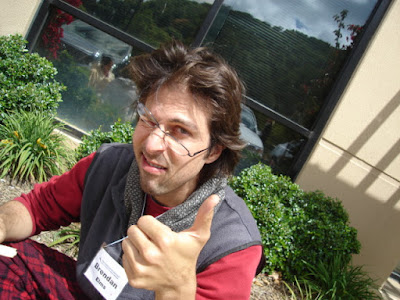
This a letter to Feldy Forum:
Therapy and the Feldenkrais Method.
Lots of wonderful conversations on this. FM involves touch. Therapy involves talk. Boundary issues. Cross possibilities and prejudices. And so on.
Some elusive obvious comments:
What do Feld and therapy have in common that helps create real change?
Listening.
Clarifying.
Creating options.
Now, a cynical and realistic way of seeing most of therapy is: someone paying to be listened to.
More harsh, and also true: paying someone to listen to their crap.
(Necessary corollary in therapy training: how not to be a human toilet).
But, not to run too blithely with this, let’s notice how non habitual, indeed, how remarkable ANY listening really is.
Take Ms. Teardrop with the statement: “My husband verbally abused me again last night.”
Here are the gamut of habitual responses she might get in the “real world.” Notice that all are forms of non-listening.
ENCOURAGING FIGHT OR FLIGHT.
1. You should get out of the relationship, fast.
2. You should tell that bastard off.
3. You should tell him off, and dump him.
ENCOURAGING VICTIMIZATION
4. Oh, you poor person. You have such a hard marriage.
5. Dual victimization: Me, too. My husband is… We are so…
6. Dual and competitive victim: You think that’s bad, my husband…
7. Historical victim: You probably had a mother/father who was …, let’s dwell on your rough past
8. Historical dual victims: We both had really tough mother/father, let’s dwell on …..
9. Historical competitive victims:
DIVERSION TO SEXUALITY
(We aren’t talking therapy here. We are talking the main set up for work place “romances.)
10. Oh, poor you. He doesn’t really understand you. I do. Let’s get really close and you’ll feel all better.
11. Oh, poor us. My mate doesn’t understand me, yours doesn’t understand you, let’s get together
Actually: this is a common, poor me and poor you, let’s talk about our bad past relationship and then get together strategy, even if it’s not the adultery route.
Anyway: in common to all the habitual responses: not listening.
Elaine has called therapy, my rephrasing, the rebuilding of a person via the chance to have a good relationship. This, at least in the times I’ve read, hasn’t been defined, but by combining the above examples, and her list of what you can’t do in therapy (abandon, scold, sexualize), you could take another elusive obvious step and say, a good relationship is relationship that is not a bad one.
Actually, just to fill out the not listening possibilities in the “real world,” now I’ve remembered the abandoning and scold/belittling thing, we’ve all seen those:’
ABANDON
12. I’m sick of hearing about your problems . I’ve got too much on my plate. Bye.
SCOLD/ BELITTLE ( often done by a family member to whom one goes for “help”)
13. That’s so stupid of you to keep putting up with his crap.
14. I told you not to get together with ….
15. When are you going to realize….
HELPER ROUTE:
16. What you need to do is this…..
Okay,
So good therapy would preclude all the not listening possibilities that “real life” often offers someone who opens the conversations with the “my husband verbally abused me again” complaint.
Now, Carl Rogers had an ingenious way to do this listening: He’d just say, I hear you say your husband ….
This seems silly. But in contrast to all the ways of not listening is actually fairly profound, and indeed couple to couple arguments can be radically dissolved by people taking turns listening to each other and then feeding back what was said before they have their chance to put in their “defense”, which is often their attack.
Traditional therapy can go off into unproductive waters if the Carl Rogers, “I hear you say…”, is followed by: how do you feel about that?
Why.
Because it’s missing the second of the elusive obvious steps: CLAIRIFICATION:
What did your husband say that you felt was verbally abusive?
Say she says,
He said I was selfish, and a liar, and only cared about myself.
Okay. Now we have clarification.
What to do from here gets interesting. You could go the, to me, unproductive, how did you feel when he said you were selfish route.
You could Gestalt: how do you feel and what are you aware of now, as you talk about that. Or the Gestalt, hop back and forth on two chairs, and get some communication going.
But, in a process I’ll talk about in some later posting, that I find accomplishes most if not all that therapy does, and then some, here is an amazing way to get some options, and go into non habitual territory.
Have a discussion with Ms. Teardrop about: is it true you are sometimes selfish, as am I and everyone on this planet. Is it true you are a liar, as am I, and …. Is it true that sometimes you only care about yourself, as it is true for me and everyone on this planet.
Then what happens to the verbal abuse.
It turns into words we didn’t want to hear.
Oh, well.
There is more. But this is a start.
Next step: What Ms. Teardrop dislikes about her husband, and how that can all be turned into awareness and self realization. Later, for that.
Anyway: touch or no touch: if you keep the person doing what they always did, they’re stuck in the poop. If you get them to slow down, feel validated for being a person who does whatever they do (listen), get some clarity on what’s going on, and provide new ways of ACTING IN THE WORLD, then you've provided some real and wonderful help. (I like Paul’s thing of ACTING as one of the big four).
So: car keys, weird dad, mom hostage. Calls for action. I could go into this one and have a lot of fun, which again is non habitual, since this is supposed to be real bad stuff, but, one of the first things I’d ask is: is it true you need to do anything about this?
Ciao,
Chris






